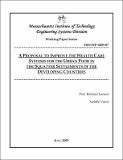| dc.contributor.author | Larson, Richard Charles | |
| dc.contributor.author | Varol, Nebibe | |
| dc.date.accessioned | 2016-06-03T14:14:36Z | |
| dc.date.available | 2016-06-03T14:14:36Z | |
| dc.date.issued | 2003-07 | |
| dc.identifier.uri | http://hdl.handle.net/1721.1/102910 | |
| dc.description.abstract | Rapid urbanization and large scale population movements from rural to urban areas have resulted in unprecedented health crises in the developing countries. In addition to communicable diseases, respiratory infections and malnutrition, psycho-social stresses due to marginalization and exclusion from social activities and employment prospects are also prevalent. Considering the rate of urban growth rate and the rapid increase in the percentage of the poor living in urban areas, the debilitating effects of health crises and urban poverty are going to exacerbate if no precautions are taken. In this respect, it is a critical point in time to come up with effective health care strategies for the urban poor. This document provides an insight into the reasons behind the current health problems of the urban poor and the determinants of health in developing countries, and proposes use of operations research to come up with handling strategies for the major subdivisions of the health problem in the developing world. | en_US |
| dc.language.iso | en_US | en_US |
| dc.publisher | Massachusetts Institute of Technology. Engineering Systems Division | en_US |
| dc.relation.ispartofseries | ESD Working Papers;ESD-WP-2003-07 | |
| dc.title | A Proposal to Improve the Health Care Systems for the Urban Poor in the Squatter Settlements of the Developing Countries | en_US |
| dc.type | Working Paper | en_US |
